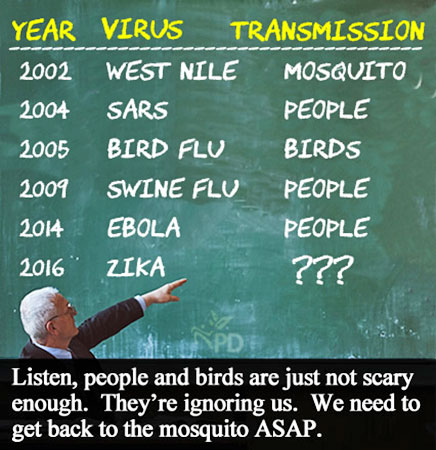|
February 15, 2016 from PreventDisease Website
The answer is endless, because most of the world is catching on very quickly to the obvious and pathetic attempts to shove fabricated pandemics down the throats of billions. Zika has now been officially entered into the database of global disease fear mongering.
The latest news from Hawaii has the 'pineapple state' declaring a state of emergency, despite zero cases transmitted of the virus.
Generating Fear Through Invisible Threats
The end game is always the same - a
vaccine or drug that will be expeditiously developed to protect
everybody and forcibly introduced to populations if necessary.
Much of the focus around the "Zika virus" has centered around presumed cases in Brazil, but there is never any mention of all the contaminated water supplies, fumigation with lethal poisons, sanitation deficiencies and widespread use of pesticides banned in most of the world.
In
a report by the Physicians in
the Crop-Sprayed Towns (PCST), the group provided clear evidence
that the area in which most of the infected persons were recorded,
had been
sprayed with a larvicide known to cause birth
defects.
How convenient that the chemical
pyriproxyfen
was added to the state of
Pernambuco's drinking-water reservoirs in 2014, by Brazil's Ministry
of Health in an botched effort to prevent the spread of the Zika-carrying
mosquitoes.
Another report from a Brazilian association called Abrasco, noted that,
There has been a massive cover-up and incredible effort on behalf of the Brazilian government to show that Zika was present in all the microcephaly cases.
The real question is
who launched the fake epidemic story
in Brazil?
Due to the state's dengue fever outbreak
on Hawaii's Big Island, where there were more than 250 confirmed
cases, officials are playing paranoid under the assumption that
other vector borne diseases could cause the same problems.
Should the U.S. declare a national emergency, the government can potentially enforce laws designed for dealing with deadly pandemics such as bringing about mandatory vaccination programs.
They include:
They are always based on huge assumptions.
Both the WHO and CDC claim that by employing their monitoring standards on outbreaks from different parts of the world, they are able to obtain sufficient information to make tentative conclusions about how these viruses may evolve.
Much of their clever phrasing is
convincing enough to conceal the fact that all their disease
policies on response and preparation recommendations are based on
pure speculation and
junk science which become very
apparent and prevalent in policy response.
This isolation, in turn, renders the public ever more fearful.
What's more, media outlets, politicians, modern medicine and businesses all have learned to capitalize on this distinctly modern sense of dread, and thus profit from finding ways to cultivate the boogeyman.
Until we find a way to see through
this generated fear, we'll live at the mercy of these emotional
entrepreneurs - and in doing so, be party to the personal, cultural,
and political consequences...
|


